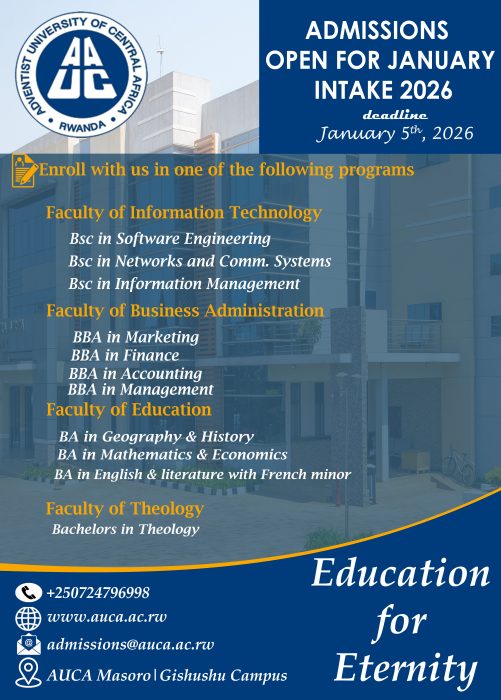ACCT 8224 Intermediate Accounting II 10 credits
As a continuation of Intermediate Accounting I, this module deals with a study of accounting concepts and principles; inventory management; accounting policies and changes in accounting estimates and errors; plant, property and equipment; intangibles assets; investments and financial instruments; leases; provisions and contingencies; earning per share; income taxes; accounting for receivables; accounting for pension and post-retirement benefits and. Prerequisite: ACCT 8211 Intermediate Accounting I
ACCT 8313 Cost Accounting 10 credits
This module is a study of cost determination, accumulation systems (accounting for materials’ labor and overheads, and preparation integrated accounts) allocation procedures. Costing methods (job and batch costing); process costing, costing in non- manufacturing sectors; marginal and absorption costing approaches. Prerequisite: ACCT 8211 Intermediate Accounting
ACCT 8315 Advanced Accounting I 10 credits
This module deals with advanced Intermediate Accounting theory with problems in preparation and presentation of financial statements for corporations; joint ventures; branch accounts ; consignments and other agency selling; investment in securities (equity); preparation of consolidated financial statements; (group accounts and business combination); interpretation and analysis of financial statements. Prerequisite: ACCT 8224 Intermediate Accounting II
ACCT 8322 Advanced Accounting II 10 credits
This is a continuation of Advanced Accounting I. A study of multinational accounting, bankruptcies and liquidation; worldwide diversity and adoption of IFRS; Interim and segment reporting; accounting for non-profit organizations (clubs, charities, hospitals, schools, etc.); insurance companies. Prerequisite: ACCT 8315 Advanced Accounting I
INSY 8316 Accounting Software Application 10 credits
This module deals with application software that records and processes accounting transactions within functional modules such as accounts payable, accounts receivable, payroll, trial balance, and preparation of financial statements. It functions as an accounting information system. Prerequisite: ACCT 822: Intermediate Accounting II
ACCT 8226 Taxation I 10 credits
The module covers theory of taxation, taxation of income of persons, capital deductions, tax-administration of income tax, administration of value added tax, administration of customs taxes and excise taxes, taxation of specific sources of income. Prerequisite: BSAD 8212 Business Law
FINCE 8312 Money and Banking 10 credits
The module features the nature and qualities of money, commercial banking, operation and controls of central banks such as the National Bank of Rwanda. The module also focuses on the U.S. Federal Reserve System, money and credit circulation, and effects of monetary policies. Prerequisite: ECON 8214 Macroeconomics
ACCT 8412 Auditing I 10 credits
This module is an examination of financial statements as applied by internal and external auditors. It deals with auditing theory, audit standards and professional ethics. Prerequisite: ACCT 8315 Advanced Accounting I
ACCT 8421 Auditing II 10 credits
As a continuation of auditing I, the module covers the detailed audit of the balance sheet accounts and the related revenue and expense accounts. Principles of internal control are emphasized. It also includes topics in operational and governmental audit. Practical audit problems and auditing in an electronic data processing environment are incorporated in this module. Prerequisite: ACCT 8412 Auditing I
ACCT 8416 Public Accounting 10 credits
This module focuses on current standards, practices, operations, analysis of transactions, and other accounting concepts involved in Intermediate Accounting of governmental and non-profit organization. Prerequisite: ACCT 8224 Intermediate Accounting II
ACCT 8325 Taxation II 10 credits
The module will cover advanced aspects of the taxation of business income, Taxation of Specialized activities, Tax investigation, Taxation of cross border activities, tax planning, tax system and policies, professional ethics in taxation and emergence trends in taxation. Prerequisite: ACCT 8226 Taxation I
ACCT 8411 Forensic Accounting 10 Credits
This module explores the forensic accountant’s role in today’s economy. Topics covered include fraud detection and fraud investigation techniques, valuation of closely held businesses, lost profits analyses, and various types of litigation support services. Fundamental legal concepts governing expert witness testimony are also examined, and students are required to quantify economic damages in cases. By the end of the module students are able to understand both the pervasiveness and the causes of fraud and white-collar crime in our society, examine the types of fraud and fraud schemes that affect business enterprises, explore methods of fraud detection and prevention, and increase their ability to recognize potential fraudulent situations. Prerequisite: ACCT 8315 Advanced Accounting I

